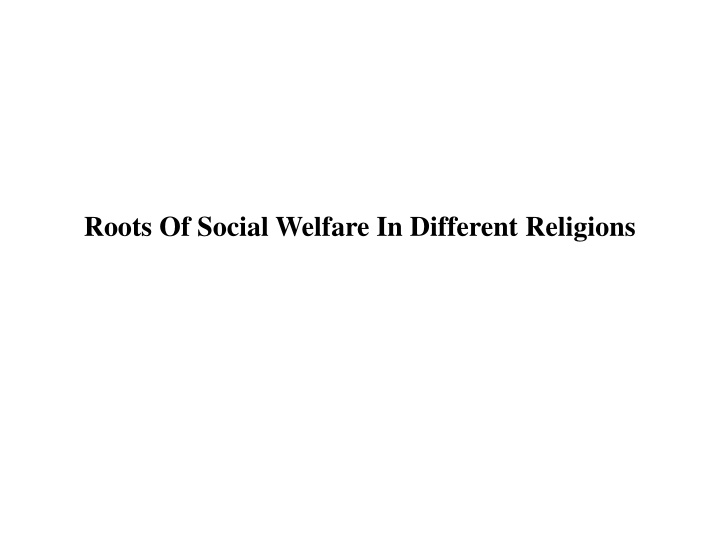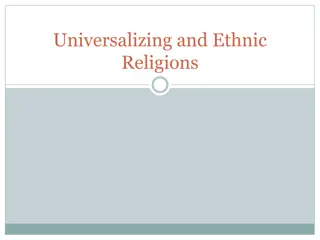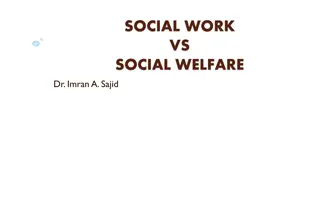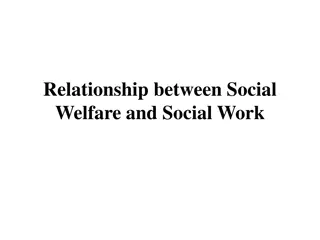Perspectives on Social Welfare in Different Religions
Christianity emphasizes mercy and kindness through personal charity and structural societal changes. Hinduism promotes selfless service, compassion, and mutual aid. Buddhism focuses on equality, charity, and environmental stewardship to uplift society.
Download Presentation

Please find below an Image/Link to download the presentation.
The content on the website is provided AS IS for your information and personal use only. It may not be sold, licensed, or shared on other websites without obtaining consent from the author.If you encounter any issues during the download, it is possible that the publisher has removed the file from their server.
You are allowed to download the files provided on this website for personal or commercial use, subject to the condition that they are used lawfully. All files are the property of their respective owners.
The content on the website is provided AS IS for your information and personal use only. It may not be sold, licensed, or shared on other websites without obtaining consent from the author.
E N D
Presentation Transcript
Christianity and Social Welfare Christianity is based upon the teachings and miracles of Jesus Christ. Just like all other religions, Christianity is also based on humanitarian philosophy. It emphasizes on serving humanity and reducing sufferings. Therefore, mercy, forgiveness and kindness are its basic rules. Christian missionaries specially serve in monasteries. They have established free educational institutions, orphanages, rehabilitations centers and shelter homes for destitute. The Christian community s response to the questions of poverty, and the poor may be sketched in terms of four major perspectives, The first perspective, both chronologically and in continuing popularity, is personal charity. The second perspective supplements the remedial work of personal charity by efforts for preventive welfare through structural changes in society. The third perspective is a retreat into the charity models of the earlier Christian community. The fourth perspective, present in churches of the modern period, envisions systemic social change to facilitate redistribution of the world s wealth.
Hinduism and Social Welfare The term Hinduism refers to the various forms of religious and philosophical beliefs practiced by the indigenous people of India . Hinduism is considered as one of the oldest religious practice among the human civilizations. It is considered not only as religion but also viewed as a philosophy and way of life. The Hindu philosophy propagates the values of self-less social service, compassion, mutual aid and interdependence, unconditional love for the vulnerable groups and concerns for the community which are considered important in social work education and practice. The Hindu Philosophy and Traditions are replete with the importance accorded to the spirit of service and compassion; and sacrifice of personal gain in favor of others less fortunate. The Hindu concepts of social conscience and social concern emphasize the fact that one s welfare is entwined with that of others. The mutual aid and mutual interdependence have been in practice right from the ancient times.
Buddhism and Social Welfare Buddhism originated in India about 2,500 years ago. This religion is derived from teachings of Buddha (original name was Siddhartha Gautama ) also known as Gautama Buddha. Three most important aspects of Buddhist philosophy are Knowledge, righteousness and charity. Buddhism specially emphasized on knowledge and learnings. Besides, it focuses on fulfillment of basic needs such as construction of shelters for the homeless, building and repairing roads, digging well for drinking water and so on.
Buddhism and Social Welfare Social welfare in Buddhism ranges activities on all societal levels (micro, mezzo and macro). Therefore, it includes simple individual acts of charity, donation, teaching, training . And organized kinds of services like community development and political activity for a better society. It believes in equality of all members of society regardless of any discrimination of caste, colour , religion and language . It secures the rights of weaker sections such as protection of untouchables and women . Another distinctive characteristic of Buddhism is environmental up gradation. There is an attempt in Buddhism to bring in a value dimension to even such concepts as wealth (dhanna) and poverty (dalddiya) that are usually interpreted purely in material terms. According to Buddhism, one may be very rich in material wealth, but poor in the moral riches.
Sikhism and Social Welfare Sikhism is only five hundred years old and the youngest religion of the world. Guru Nanak is the spiritual leader of the Sikhism. Sikhism believes in equal distribution of the fruits of labor. It believes in helping people in need. Sikhism believes that charity is given only by God and human beings have just to share the boon given by God. The charity money is used for imparting the professional education in the area of engineering and medical fields to the people to eliminate poverty among human beings. Sikhs are ordained to contribute voluntary payment of tithes for Guru, Kar Seva of holy pools, schools, hospitals for sick and general uplifts of the humanity as a whole.
Jainism and Social Welfare Jainism originated in sixth century in India. It is traditionally known as Jain Dharma . The religion derives its name from the jina ( conqueror ). Mahavira, is considered the founder of Jainism and followers are called Jains. It is a religion of self-help. The essence of Jainism is concern for the welfare of every being in the universe and for the health of the universe itself. The three guiding principles of Jainism, the three jewels , are right belief, right knowledge and right conduct. Basic principles of Jainism are rebirth, non-violence, speaking truth and detachment from material world. It is an ethical religion based on faith, knowledge and virtuous human behavior. For Jains, social welfare is direct related to just human society and non-violence. Therefore, Jain have established many service institutions along with their temples such as monasteries, shelter homes, orphanages, educational institutions and libraries, women, dispensaries and hospitals, bird houses and veterinary clinics, etc. They also work against social taboos such as caste system, class system and violence against women.
Judaism and Social Welfare The high value placed by the Jewish tradition on concern for the welfare of others has its roots in the Torah. The Jewish follow Torah and the Rabbis by seeking God s will to provide justice into a practical legislative system of distributing social welfare rights and equity within Jewish society. Everything that you want others to do for you, do for anyone who is your brother, the Torah and the commandments. One should give to the poor with a pleasant expression and happily, show sympathy to the needy person about his suffering. If a needy person asks for money and the other has nothing to give him then he should make the needy person feel better by speaking nicely with him. Providing for the needy and homeless must be done in a way that shows concern for the person s feelings, not only for their financial need.























